How to Ignite Customer Service Motivation: 10 Tips
Customer service motivation is key to turning representatives into enthusiastic advocates for the brand. Discover how to empower the team to deliver positive experiences that keep customers happy.

Customer service motivation is key to turning representatives into enthusiastic advocates for the brand. Discover how to empower the team to deliver positive experiences that keep customers happy.

Ever experienced excellent customer service that felt satisfied and content? 80% of US consumers view speed, convenience, knowledgeable help and friendly service are the most important elements of a positive CX. The key factor behind exceptional customer service is the employees’ motivation and dedication.
Customer service motivation is the cornerstone of any successful business. It can make or break a company’s reputation and impact its bottom line. Dedicated employees drive customer loyalty and business growth through top-notch service.
The article delves into customer support motivation, its positive business impact and enhancing employee motivation culture. Let’s delve into the world of customer service and discover how motivation is pivotal in creating exceptional customer experiences.
Customer service motivation refers to the internal drive and enthusiasm that empowers service representatives to deliver exceptional assistance to customers. It combines personal satisfaction from helping others with the desire to solve problems effectively. The motivation creates a positive cycle where genuine interest in customer needs leads to better service experiences which in turn reinforces the representative’s sense of accomplishment.
The approach operates through a blend of intrinsic and extrinsic factors that energize staff daily. When you make your team members feel valued and see the direct impact of their work on customers’ lives, they naturally want to perform better. You can nurture such motivation through recognition programs, growth opportunities and a supportive environment where employees can thrive.
Key objectives:
Explore the myriad benefits of keeping your customer service team engaged and why the investment is one of the smartest moves a company can make.
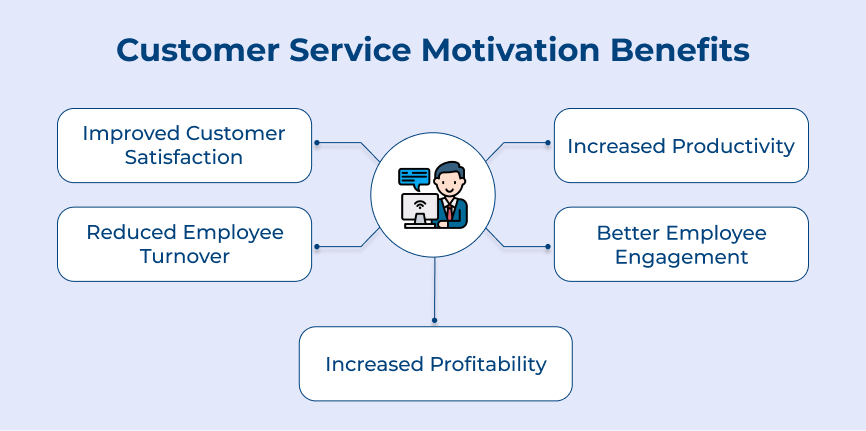
1. Improved customer satisfaction: Motivated teams go the extra mile to provide excellent customer service. It will enhance customer satisfaction by showing extra attention to their needs.
2. Increased productivity: A motivated team is a productive team. Motivated customer service leads to faster responses and efficient issue resolutions. It will help improve the customer experience and satisfaction.
3. Reduced employee turnover: Motivated employees are more likely to stay with the company for a longer period. Investing in customer service team development can lower turnover and keep top talent. It will help save time and money on training new employees.
4. Better employee engagement: Motivated employees are more engaged and committed to their work. When the customer service team feels valued, they provide excellent service to customers. It will create a positive work environment and improve team morale.
5. Increased profitability: A motivated customer service team will lead to increased profitability for the business. Satisfied customers tend to make repeat purchases and recommend the offerings to others. Investing in the motivation of the team, can drive revenue growth and achieve long-term success.
Check out the key drivers that spark motivation in your customer service team, helping them stay energized, engaged and consistently deliver outstanding support experiences.
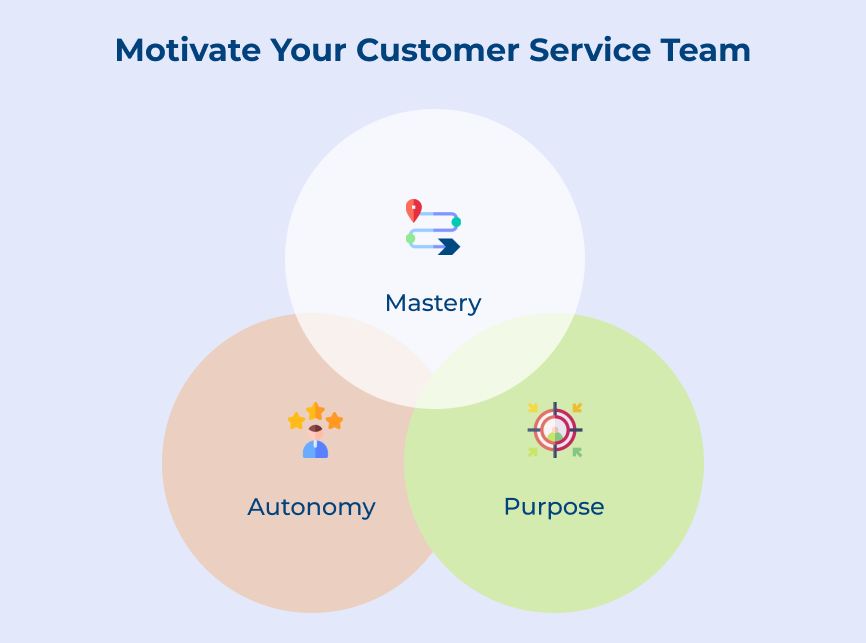
Autonomy relates to the independence and control customer service representatives have. Employees with autonomy can make decisions and take action independently. A sense of independence can lead to increased job satisfaction and motivation.
Autonomy allows representatives to tailor their interactions with customers based on their judgment and expertise. It can lead to more personalized and effective customer service experiences. Let’s assume a customer service representative has autonomy. He can efficiently resolve customer issues by providing creative solutions beyond standard protocols.
Mastery refers to the desire to improve skills and knowledge in a particular area. Motivated customer service representatives strive to improve skills and support customers better. The drive for mastery can lead to a higher level of commitment to excellence.
Providing training for customer service representatives can help enhance a culture of mastery within the team. Encouraging employees to attend customer service events can expand their knowledge. Setting performance goals and providing feedback can help employees track their progress.
Purpose refers to the greater meaning and significance that employees derive from their work. Motivated customer service representatives find purpose in making an impact on others. Employees who find their work meaningful and impactful are more engaged in their roles.
Businesses can emphasize the importance of their role in the overall customer experience. Rewarding employees for enhancing customer satisfaction reinforces purpose-driven motivation. Aligning organizational and individual values helps employees connect work to a larger mission or vision.
Let’s go through the most common challenges faced and explore how you can effectively revitalize motivation in your customer service operations.
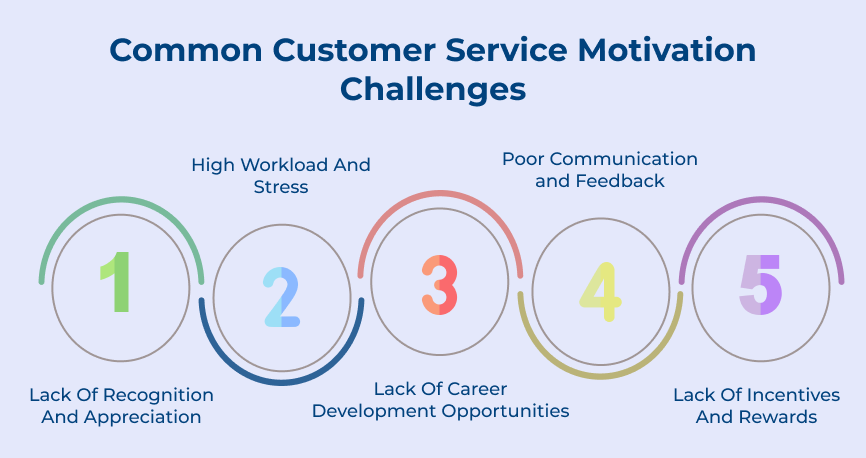
Motivating customer service teams can be tough due to insufficient recognition and appreciation for their hard work. Without acknowledgement of their efforts, team members can become demotivated. Employee recognition is most important to more than 30% of employees.
Regularly appreciating team achievements and hard work is essential for overcoming challenges. It can be done through public acknowledgment, rewards, or even simple thank-you notes. Showing appreciation can boost morale and create a more positive work environment.
Customer service roles require managing a heavy workload from continuous customer interactions and meeting performance targets. It can lead to burnout and demotivation among team members.
Support should be provided to help the team handle the workload effectively and overcome challenges. It can include regular breaks, flexible working hours and training opportunities to enhance their skills. Addressing the underlying causes of stress, can prevent burnout and motivate team members.
Customer service team members often lack career development opportunities in the organization, hindering motivation. Without a clear path for growth, team members may lose motivation and look for opportunities elsewhere.
Providing career development like training, mentorship and advancement is crucial to overcoming challenges. Investing in the team’s growth can show that the business supports their long-term career goals.
Effective communication and feedback are essential for motivating customer service team members. Lack of feedback can make team members feel disconnected and unsure about improving performance.
Establishing open communication within the team is key to overcoming challenges. Encourage team members to provide feedback for improvement. Promoting a culture of open communication can enhance team collaboration.
Incentives and rewards motivate customer service team members by offering tangible recognition for their hard work. The absence of incentives and rewards can lead to decreased performance.
Implementing a rewarding system for outstanding performance helps overcome challenges. It can include bonuses, incentives, or even non-monetary rewards such as extra time off or public recognition. Providing meaningful incentives and rewards can encourage team members to strive for excellence.
Here are the top customer service motivation tips that can help elevate your team’s spirit and in turn, the quality of service they provide.
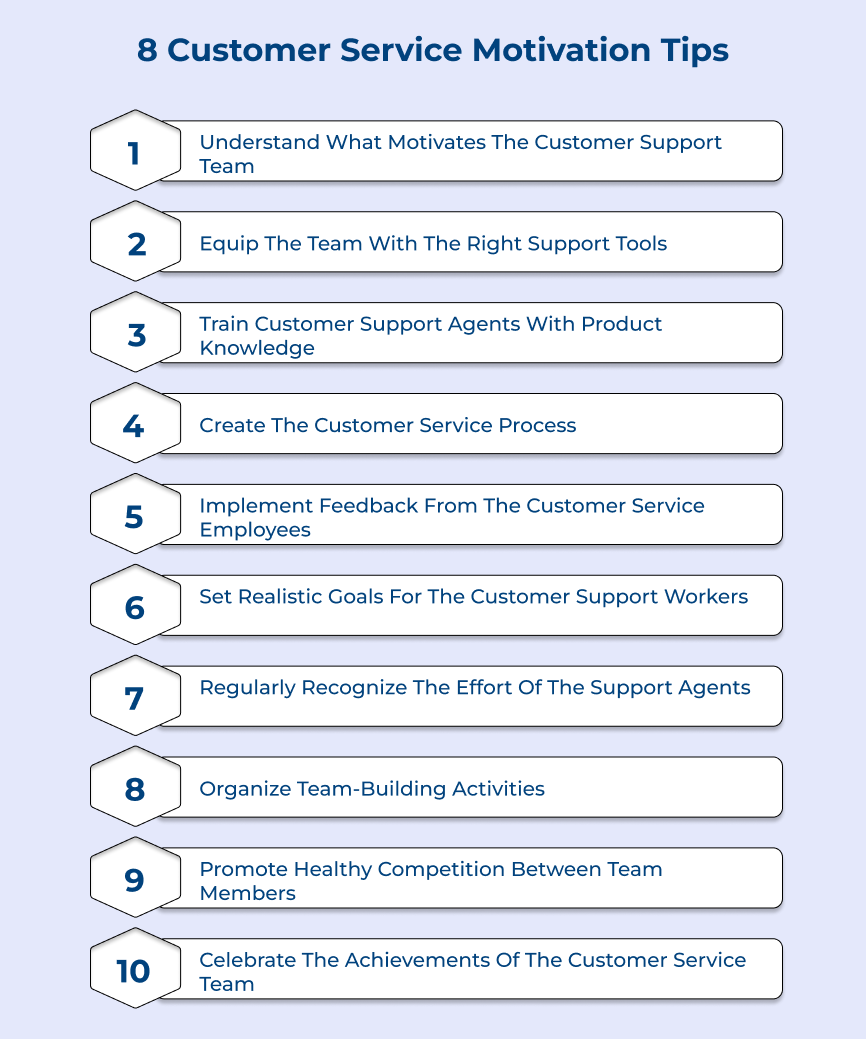
Understanding customer support team motivation is crucial for optimal performance and service excellence. Get to know the team on a personal level, understand their goals, acknowledge achievements and appreciate their hard work.
Let’s consider that a brand has a team member who is motivated by career advancement. It can provide them with opportunities for professional development and growth within the company. If another team member is motivated by recognition, it can publicly acknowledge their achievements.
Pro tips:
Equipping the team with the right support tools is crucial when it comes to motivating the customer service team. Providing the necessary resources can empower them to deliver exceptional service to customers. One key strategy is providing the team with reliable communication tools like a CRM system or messaging platform to streamline customer interactions.
Training keeps the team informed by sharing industry trends and best practices. Let’s assume that offering skill-building workshops can help the team members develop their skills and stay engaged in their roles.
Essential support tools:
Training customer support agents with product knowledge is a crucial strategy. It keeps the customer service team motivated. When agents understand their products well, they offer better customer support, boosting satisfaction and loyalty.
Let’s consider a customer who calls in with a specific question about a product. A well-trained agent with product knowledge can quickly answer their query. It helps in building trust and confidence in the brand.
Pro tips:
Creating a solid customer service process is essential for any business. One effective strategy to motivate your customer service team is by implementing clear processes. Establishing a clear customer service process guides the team in managing customer inquiries effectively.
Let’s assume businesses can create a process where all customer inquiries are logged and assigned to the appropriate team member. It ensures that no customer concern slips through the cracks and that all issues are addressed promptly.
Pro tips:
Implementing feedback from the customer service employees is crucial. It helps in motivating the team and improving the overall customer experience. Listening to frontline workers can provide businesses with insights on successful practices and areas for improvement.
Let’s consider a customer service team that consistently receives feedback about a particular offering being confusing to customers. Businesses can take action to address the issue and ensure that future interactions are more efficient.
Pro tips:
Setting realistic goals for customer support workers is crucial in keeping them motivated and engaged in their roles. When employees have clear and achievable goals, they feel more accomplished in their work.
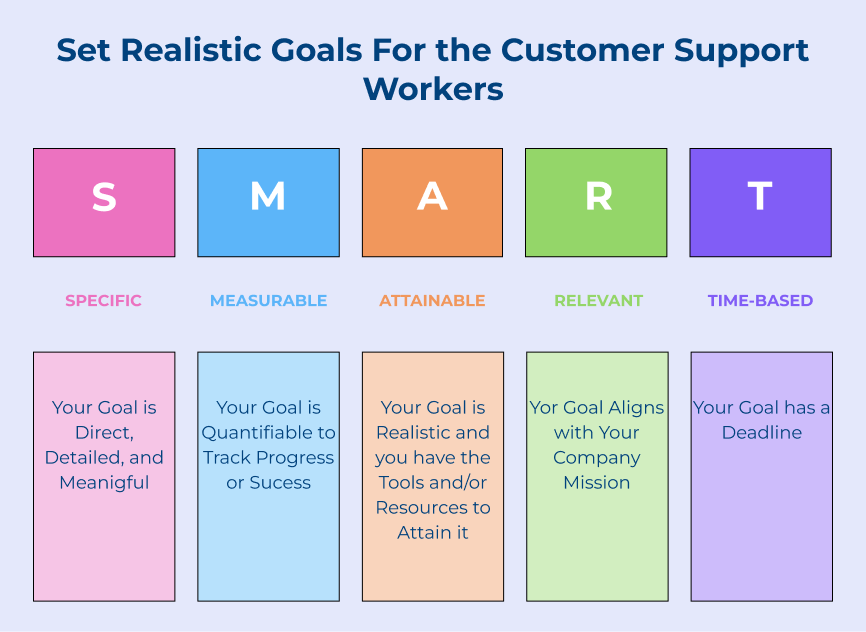
Let’s assume a brand sets a goal for the customer support team to decrease response times by 20% within the next month. It gives them a clear target to work towards. They can track their progress and see the impact of their efforts in real time, which can be highly motivating.
Pro tips:
Recognizing the efforts of the support agents is a crucial strategy to motivate your customer service team. Recognizing support agents’ efforts boosts morale, job satisfaction and enhances exceptional customer service.
Establishing a monthly recognition program to reward top agents with incentives like gift cards or time off shows appreciation effectively. Acknowledging achievements in team meetings or company-wide emails can motivate them to deliver outstanding service consistently.
Pro tips:
Organizing team-building activities is a key strategy to motivate your customer service team. The activities are designed to promote teamwork, improve communication and boost morale within the team. 90% of employers say a sense of community is key to success.
Let’s assume a team-building activity could involve a group scavenger hunt. Team members work together to solve clues and complete tasks. It not only promotes teamwork and problem-solving skills but also allows team members to bond outside of the office.
Pro tips:
Promoting healthy competition between team members is a great strategy to motivate your customer service team. Encouraging positive competition among employees can enhance morale, productivity and customer satisfaction. One way the strategy can help is by setting rewards for top performers.
When team members have something to strive towards, they are more likely to put in extra effort to achieve success. Let’s consider that a business creates a monthly competition. The customer service representative with the highest customer satisfaction rating receives a bonus or special recognition.
Pro tips:
Recognizing the customer service team’s accomplishments is both rewarding and motivating. Recognizing and appreciating their hard work can create a positive work environment that encourages teamwork. Celebrate customer service team achievements with recognition programs, outings, or awards to boost motivation.
The strategy helps to instill a sense of pride and accomplishment in employees, enhancing a culture of appreciation. Let’s assume that a business highlights the top performers of the month, quarter, or year and rewards them with bonuses or certificates. Recognizing exceptional customer service skills for customers can also help to inspire others to strive for excellence.
Pro tips:
Let’s go through the five best practices that can redefine your approach to motivating customer service teams and elevate your business to new heights of success.
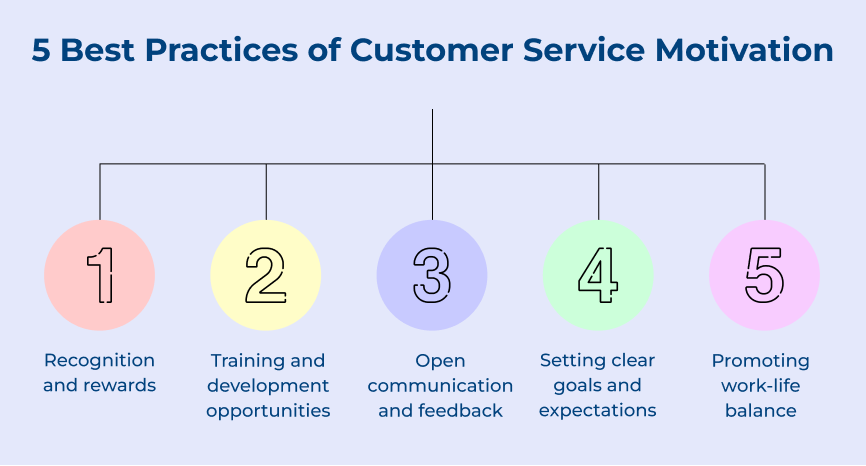
1. Recognition and rewards: Acknowledging and rewarding outstanding customer service performance is an effective way to motivate employees. Recognition can come in the form of public praise, bonuses, incentives, or even simple verbal appreciation. Rewards may include money, extra vacation time, gift cards, or company merchandise. Recognizing and rewarding exceptional service boosts employee morale for continued high-quality service.
2. Training and development opportunities: Continuous training for customer service representatives demonstrates company commitment to their growth. Training covers best practices for customer service, communication, conflict resolution and product knowledge. Development opportunities can include workshops, seminars, online courses and mentorship programs.
3. Open communication and feedback: Promoting open communication in customer service enhances a positive work environment. Utilize team meetings, check-ins and suggestion boxes to enhance communication. Managers must give helpful feedback and be attentive to team members’ concerns.
4. Setting clear goals and expectations: Setting clear goals and expectations helps customer service teams stay focused. Goals should be specific, measurable, achievable, relevant and time-bound (SMART). Employees set KPI targets like response time, customer satisfaction and resolution rates for a roadmap to success. Regularly tracking progress, providing feedback and celebrating achievements keep teams motivated.
5. Promoting work-life balance: A healthy work-life balance is vital for employee motivation and well-being. Considering flexible work hours, remote work options and sufficient rest time is crucial. Customer service teams can improve motivation and service quality through prioritizing work-life balance.
Following are the four compelling examples of how companies have effectively motivated their customer service teams, leading to outstanding customer satisfaction and business success.
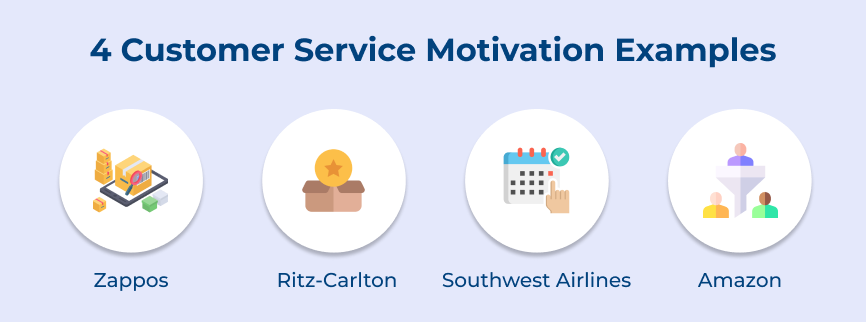
1. Zappos
Zappos, an online shoe and clothing retailer, is renowned for its exceptional customer service. Tony Hsieh, the company’s CEO, focuses on creating a customer-centric, positive company culture. Zappos representatives provide phone assistance and gifts, consistently exceeding customer expectations. It has helped Zappos to build a loyal customer base and generate positive word-of-mouth.
2. Ritz-Carlton
The luxury hotel chain Ritz-Carlton places a high value on customer support motivation. The company empowers its employees to take ownership of guest experiences and deliver personalized service. Ritz-Carlton’s motto emphasizes every employee’s essential role in creating memorable guest experiences. Ritz-Carlton’s emphasis on staff motivation led to an excellent customer service reputation.
3. Southwest Airlines
Southwest Airlines is known for its friendly and helpful customer service. The airline encourages its employees to embody a friendly attitude when interacting with customers. Southwest Airlines allows employees to autonomously resolve customer issues swiftly. Southwest Airlines’ motivation enhances a robust customer service culture, resulting in high satisfaction levels.
4. Amazon
Amazon is a global e-commerce giant that places a strong focus on customer service. Jeff Bezos, the company’s founder, stresses customer satisfaction as the top priority. Amazon prioritizes customer needs through fast shipping, easy returns and exceptional support. The company incentivizes customer service teams for exceptional performance.
Great customer service doesn’t happen by accident! It comes from a motivated team that actually cares about the people they’re helping. When employees feel proud of their work, are given the tools to succeed and are recognized for doing a good job, they naturally go the extra mile. That kind of motivation creates a ripple effect – better service, happier customers and stronger word-of-mouth.
Motivation isn’t just about rewards or team lunches. It’s about building a work environment where support teams feel heard, supported and trusted to make decisions. Clear goals, regular feedback and opportunities to grow professionally can do far more for morale than a one-off bonus. When your team feels valued, your customers are bound to feel it too!
Customer service motivation is key to turning representatives into enthusiastic advocates for the brand. Discover how to empower the team to deliver positive experiences that keep customers happy.

Motivation inspires employees to exceed customer expectations, enhancing customer service. Motivated employees create positive customer experiences by engaging energetically and enthusiastically. Motivated employees exhibit problem-solving skills and a drive for exceptional service.
Recognizing and rewarding customer service team members is crucial for maintaining motivation. Recognizing achievements, offering incentives and nurturing a culture of appreciation enhances team morale. Gamification can add a fun element, with points for positive interactions or resolving complex issues. Remember, the most effective approach personalizes rewards to what motivates the team.
Promoting open communication, professional growth and support creates a positive customer service team environment. Encouraging a culture of respect and trust can also contribute to a positive work environment. Create opportunities for fun and team bonding to keep spirits high. Prioritizing employees can help create a supportive atmosphere where they can deliver excellent customer service.
Leadership motivates service teams through clear expectations, support, rewards and a culture of improvement. Effective leaders lead by example, inspire their team and prioritize well-being. Leadership involvement is essential in creating a motivated and high-performing customer service team.
Customer service roles often face burnout due to high stress and demanding customers. Promote work-life balance, support self-care and provide resources for well-being. Monitoring team workload and well-being through regular check-ins can prevent burnout.

Market better, sell faster and support smarter with Veemo’s Conversation Customer Engagement suite of products.
Unify all your customer data in one platform to deliver contextual responses. Get a 360 degree view of the customer lifecycle without switching tools.
Connect with the tools you love to reduce manual activities and sync your business workflows for a seamless experience.
 https://veemo.io/wp-content/uploads/2025/12/customer-connection.png
1256
2400
indrasish5342@gmail.com
https://veemo.io/wp-content/uploads/2024/11/veemo.svg
indrasish5342@gmail.com2026-02-06 09:11:372026-01-19 09:14:05What is Customer Connection: Mistakes, Metrics & Examples
https://veemo.io/wp-content/uploads/2025/12/customer-connection.png
1256
2400
indrasish5342@gmail.com
https://veemo.io/wp-content/uploads/2024/11/veemo.svg
indrasish5342@gmail.com2026-02-06 09:11:372026-01-19 09:14:05What is Customer Connection: Mistakes, Metrics & Examples https://veemo.io/wp-content/uploads/2025/12/complaint-management.png
1256
2400
indrasish5342@gmail.com
https://veemo.io/wp-content/uploads/2024/11/veemo.svg
indrasish5342@gmail.com2026-02-03 09:04:022026-01-19 09:10:02What is Complaint Management? Importance, Key Steps & Strategies
https://veemo.io/wp-content/uploads/2025/12/complaint-management.png
1256
2400
indrasish5342@gmail.com
https://veemo.io/wp-content/uploads/2024/11/veemo.svg
indrasish5342@gmail.com2026-02-03 09:04:022026-01-19 09:10:02What is Complaint Management? Importance, Key Steps & Strategies https://veemo.io/wp-content/uploads/2025/12/AI-Self-Service.png
1256
2400
indrasish5342@gmail.com
https://veemo.io/wp-content/uploads/2024/11/veemo.svg
indrasish5342@gmail.com2026-01-26 09:52:482026-01-13 10:17:07What is AI Self Service? Benefits, Key Metrics and Best Practices
https://veemo.io/wp-content/uploads/2025/12/AI-Self-Service.png
1256
2400
indrasish5342@gmail.com
https://veemo.io/wp-content/uploads/2024/11/veemo.svg
indrasish5342@gmail.com2026-01-26 09:52:482026-01-13 10:17:07What is AI Self Service? Benefits, Key Metrics and Best PracticesGrow Customer Relationships and stronger team collaboration with our range of products across the Conversational Engagement Suite.

 8 Effective Ways to Build a Knowledge Sharing Culture
Scroll to top
8 Effective Ways to Build a Knowledge Sharing Culture
Scroll to top